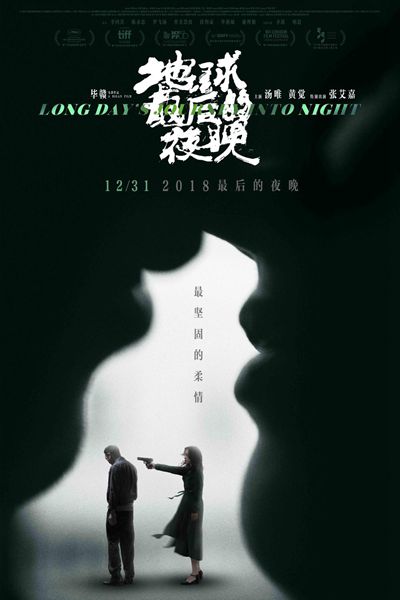Angry audiences attack art-house film
- By Zhang Rui
 0 Comment(s)
0 Comment(s) Print
Print E-mail China.org.cn, January 10, 2019
E-mail China.org.cn, January 10, 2019

The critically acclaimed, but over-promoted art-house film "Long Day's Journey into Night" may own the best opening record for its genre, yet its marketing backfired as unhappy moviegoers accused it of "cheating."
Nearing midnight on the last day of 2018, millions of Chinese moviegoers and lovers packed Chinese theaters across the nation to see this film as a rite of passage into 2019, and save the last kiss for it, just as the promoter had romantically advocated half a month before.
However, what happened on the night involved various disastrous scenarios: most of people either quit the theater early during the screening, or slept in their seats until the film was over. The combined last kiss of 2018 and first kiss of 2019 never happened.
Strangely, those moviegoers mostly came from second-tier or even fourth-tier cities, rather than the art-house genre's regular audience concentrated in first-tier cities according to the leading ticketing app Maoyan. The result was that ticketing platforms returned their lowest ratings for the film.
On Maoyan, the film was rated only 2.6/10, while on Taopiaopiao, another leading ticketing platform owned by Alibaba Group, it rated only 3.8/10.
The comment section of the ticketing platforms were flooded with users complaining the film distributors had "cheated" consumers by making it look like a romantic blockbuster, which "but certainly was not." Many also complained they didn't even understand what the director was trying to express.
Box office analysts believed the brilliant promotion, including the short-form mobile videos app Douyin marketing, made many young people in small towns across China think this film would be a very romantic and entertaining love story, providing the perfect way to spend the night with their lover. Simply put, it was a film marketed towards the wrong targeted audience.

Even though the film made a record 262 million yuan (US$38.46 million) on its debut day, the highest for its genre in Chinese history, the screening arrangements also contribute to the collapse on the next day as disillusioned theater managers rushed to cut its showtime.
On Jan. 1, the film only took in 11.19 million yuan (US$1.64 million) at the box office, fall of nearly 96 percent, unprecedented in Chinese movie history.
The bad news also ensured a sharp fall in the shares of the film's production company, Huace Film & TV, which saw its market value shrink by 1.6 billion yuan (US$234.89 million).
"Long Day's Journey into Night" thus becomes the first tragic fiasco to open the new year and thereby providing a textbook example of how badly-conceived and overdone marketing can create a major backlash.
The film should not have had to suffer like this, as it had once received praise from prominent directors like Chen Kaige and Ang Lee, as well as many film critics, after screenings at several world-class film festivals, including Cannes and the Golden Horse Film Festival.
The latest effort of the 29-year-old new talented director Bi Gan, starring Tang Wei, Huang Jue, Sylvia Chang and Lee Hong-chi, is a story about memory and love with a magical realist portrayal.
Bi's excessive self-serving style to make an artistic dream come true might turn out to be a happy discovery for art-house film lovers, film critics, researchers and academics, but it also shows the wide gap that exists between a targeted special audience and normal moviegoers in their conception of what constitutes a great motion picture in today's China.
Bi's producer and collaborator Shan Zuolong posted an article online recalling the various difficulties "Long Day's Journey into Night" encountered during the production, especially funding shortages due to over-spending. Luckily, they eventually got all the funding needed, although this reportedly raised the budget to somewhere between 50 million and 70 million yuan (US$7.33-$10.26 million), much higher than the initially envisaged spending of under 20 million yuan (US$2.93 million).
Pressure from investors forced the distributors into adopting an unusual marketing approach in order to break even.
At the premiere on Dec. 24, the director said he didn't want to think more about the box office statistics because, "I am just a man engaged in the film arts."
As the criticism spread becoming a source of jokes, and the box office returns shrank amid public talk of a "flop," the producers and promoters of the film remained silent. How the storm will affect the director's career and the development of China's art-house films in the future is not known at this time.
However, Chen Lizhi, chairman and CEO of the leading film marketing company Beijing Maxtimes Culture, wrote an article online to comment on the approach of a fellow marketing company, saying: "You don't sell artworks like you are selling health care products."
He added, "From an investor's perspective, I envy the outcome; but from a marketing professional's perspective, I would never offer up such a marketing plan."






Go to Forum >>0 Comment(s)